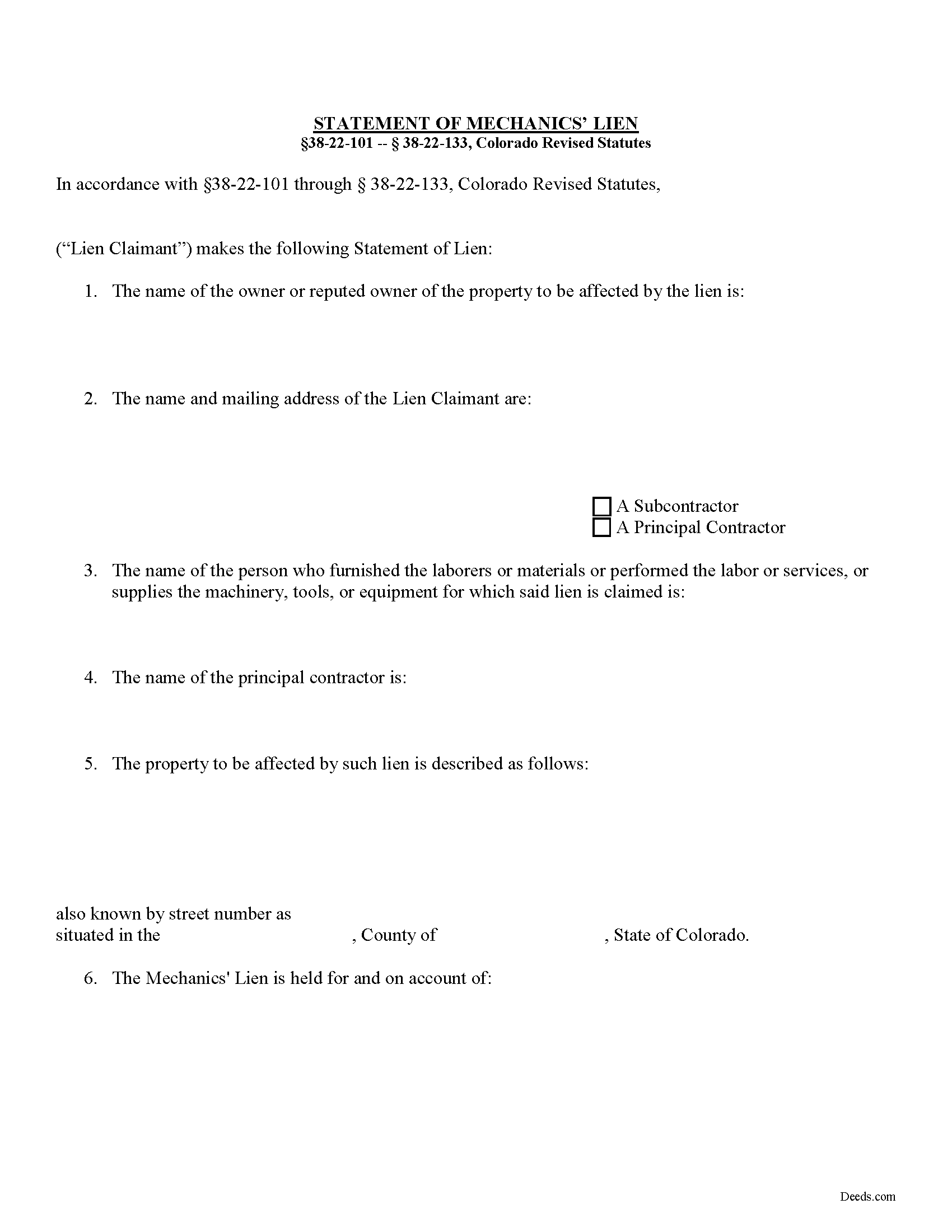Download Colorado Statement of Mechanics Lien Legal Forms

Colorado Statement of Mechanics Lien Overview

Statement of Lien in Colorado
Contractors and subcontractors have a unique remedy available to them when a property owner or some other party involved in the "chain" refuses to pay up. This special remedy is called a mechanic's lien, also sometimes known as a contractors, materialman, or construction lien. The lien works like a mortgage by giving a type of property interest to the lien holder. With a lien in place, it becomes more difficult for the owner to sell or refinance a property. Other contractors will also see there is already a lien before they begin any additional work. In Colorado, mechanic's liens are governed under 38-22-101 -- 38-22-133 of the Colorado Revised Statutes (C.R.S.). In Colorado, claimants must file a Statement of Lien document to claim a mechanic's lien.
The Statement of Lien must contain the following: (1) The name of the owner or reputed owner of such property, or in case such name is not known to him, a statement to that effect; (2) the name of the person claiming the lien; (3) the name of the person who furnished the laborers or materials or performed the labor for which the lien is claimed; (4) the name of the contractor when the lien is claimed by a subcontractor or by the assignee of a subcontractor, or, in case the name of such contractor is not known to a lien claimant, a statement to that effect; (5) a description of the property to be charged with the lien, sufficient to identify it; and (6) a statement of the amount due or owing such claimant. C.R.S. 38-22-109(1).
The Lien Statement must be signed and sworn to by the party, or by one of the parties who is claiming the lien, or by some other person on their behalf, to the best knowledge, information, and belief of the affiant; and the signature of any such affiant to any such verification shall be a sufficient signing of the statement. C.R.S. 38-22-109(2).
Before the Lien Statement can be filed, you must have fulfilled the preliminary notice requirement. In order to preserve any lien for work performed or laborers or materials furnished, there must be a notice of intent to file a lien statement served upon the owner or reputed owner of the property (or the owner's agent and the principal or prime contractor or his or her agent) at least ten (10) days before the time of filing the lien statement with the county clerk and recorder. C.R.S. 38-22-109(3). The notice of intent must be served by personal service or by registered or certified mail, return receipt requested, addressed to the last known address of such persons, and an affidavit of such service or mailing at least ten (10) days before filing of the lien statement. Id.
The timeline for filing the lien depends on who is the party claiming the lien. Mechanic's liens claimed for labor and work by the day or piece, (but without furnishing laborers or materials), must be filed for record after the last items of labor has been performed and at any time before the expiration of two months after the labor or work is completed. C.R.S. 38-22-109(4). All other lien claimants must file their claims at any time before the expiration of four months after the day on which the last labor is performed or the last act of furnishing laborers or materials. C.R.S. 38-22-109(5).
If there is an error in a filed lien statement, a new or amended statement may be filed within the periods provided for claiming a lien to correct or cure any mistake (or for the purpose of more fully complying with the provisions of the lien law). C.R.S. 38-22-109(6).
Once the lien is in place, remember it won't last forever. A mechanic's lien will not remain effective longer than one year from the filing of the lien, unless within thirty days after each annual anniversary of the filing of the lien statement, the lien claimant files an affidavit in the office of the county clerk and recorder of the county wherein the property is located, stating that the improvements on said property have not been completed. C.R.S. 38-22-109(8).
This article is provided for informational purposes only and should not be relied upon a substitute for the advice of an attorney. If you have any questions about claiming a mechanic's lien, please contact a Colorado-licensed attorney.